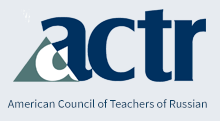Russian Language Journal
Teaching Compassion in the Russian Language and Literature Curriculum: An Essential Learning Outcome
Keywords
language, education, Russian, curriculum, foreign
Abstract
One of Dr. Olga E. Kagan’s most important contributions to the language education field was a reconceptualization of the perspective of the language performance of heritage speakers of Russian. In the past, heritage speakers’ language was considered deficient in all the ways in which it diverged from Contemporary Standard Russian. Their lack of formal instruction in Russian or the interruption of their formal instruction due to their immigration from a Russophone country to North America was considered the source of numerous errors and anglicisms, which the Russian language curriculum was designed to eliminate. Teachers of Russian as a foreign language often viewed all heritage speakers as similar despite the fact that they had very different life stories and language profiles, as Dr. Kagan and colleagues ultimately proved in their research. Furthermore, teachers of Russian as a foreign language did not appreciate the richness of the speech of heritage speakers of Russian, all of the strengths they possessed in their language use by virtue of the fact that they used the language to communicate in their home environments. Dr. Kagan’s groundbreaking work on the assessment of the language of heritage speakers of Russian and the development of instructional materials to facilitate the further development of the language skills of these individuals was a pedagogy born of compassion. And in that spirit, I share the following proposal to extend the pedagogy of compassion to be a cornerstone of the teaching of foreign languages and cultures, starting with the curriculum for Russian language, literature, and culture. To that end, I dedicate this article to the memory of our dear colleague, Dr. Olga E. Kagan.
Recommended Citation
Rifkin, B. (2019). Teaching Compassion in the Russian Language and Literature Curriculum: An Essential Learning Outcome. Russian Language Journal, 69(1). https://doi.org/10.70163/0036-0252.1040


